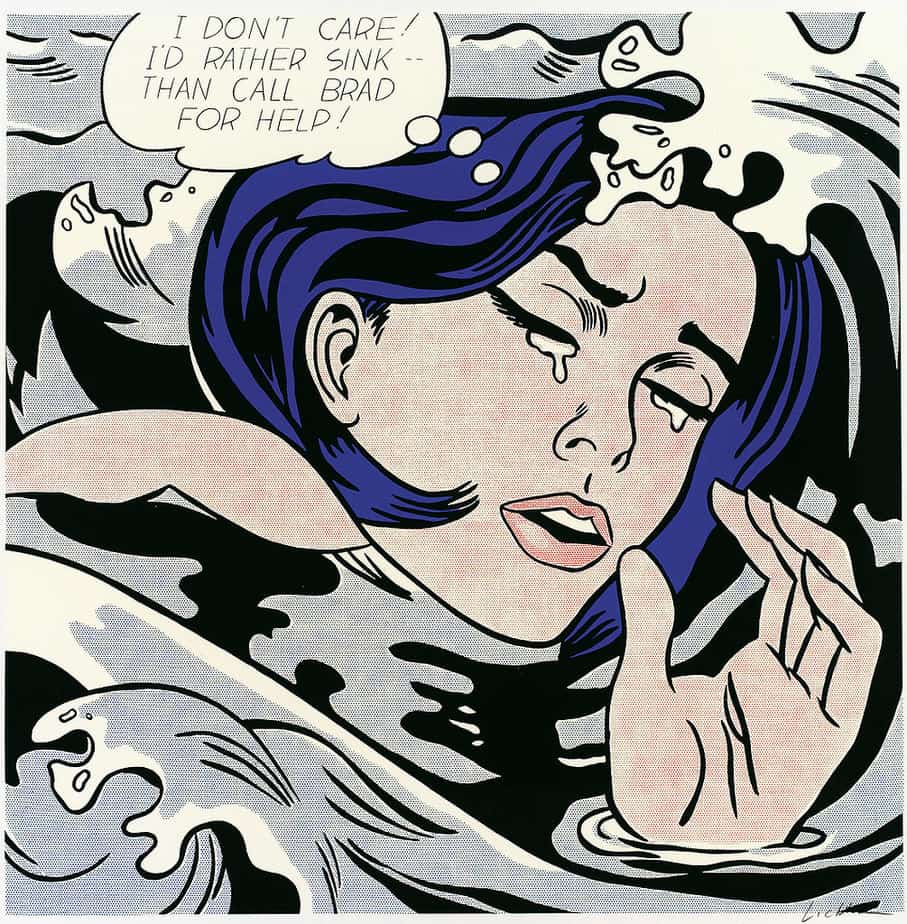Modern painting as we know it officially began in the 19th century, where the advent of cameras and photography and our abilities to capture real-life pictures made more and more people consider the painting artform antiquated. Photography was simplistic and effortless, so the need for painting became less and less necessary.
As a result of this drastic change of the landscape, artists began to change the way in which they did art. Paintings became more personal, held more impression, held more expression, were more abstract, and minimalistic. Art, in a sense, became whatever the artist said it was.
To be able to compete with photography, art had to become a complete expression of the artist themselves. Of course, there are countless works that have transcended photography, so here are some of the 25 greatest paintings of modern art for you to appreciate.
1. Poker Game (1894) by Cassius Coolidge

Coolidge was born in New York and was brought up in a family of abolitionist Quakers. The artist had no interest in farm work, so he eventually left the farm, and he began to make his mark by painting different signs, illustrating the picture in books, and creating cartoons for a newspaper.
Although he didn’t have any artistic training, he was well educated and while he was working, he created several comedy portraits. Poker Game is part of a series of comic foregrounds he produced, life-sized paintings which depict dogs doing activities that humans would normally do.
The painting sold for $658,000 dollars in 2015 and the artist has been credited with creating the anthropomorphic animal motif.
2.Rainy Day, Boston (1885) by Childe Hassam

Throughout his entire career, the American Impressionist artist Childe Hassam produced over 3000 different artworks. His specialization was often of urban landscapes, oceanic scenes, and later in his artistic career, outdoor nudity.
Rainy Day, Boston uniquely depicts Hassam’s interest in painting urban centers using oil on canvas over watercolors, which were more profitable at the time. The artist sold his works for around $6000 dollars a painting back in the early 20th century, but by the 1920s and 1930s, Impressionist works were not so favored, with much-preferring Realism, Cubism, and Surrealism work.
Following the artist’s death in 1935, the Impressionist movement made a big comeback, and the Impressionist works all of a sudden sold for considerable money again.
3.Water Lillies and the Japanese Bridge (1897-1899) by Claude Monet

Claude Monet is credited to be one of the main founders of French Impressionism and he created some of the first landscape paintings produced outdoors. The direct effect of such a method is the artist can make use of aspects such as sunlight to show outdoor objects as they are in nature, instead of an impression of how they are from an artist’s studio.
Water Lillies and the Japanese Bridge was painted at the garden and pond at his home in France and the painting is certainly one of Monet’s most impressive works. In addition to this outdoor painting, the artist traveled to the Mediterranean and painting buildings, landmarks, and ocean views there.
4.The Drowning Girl (1963) by Roy Lichtenstein

Once named by some critics as the worst artist in America, Roy Lichtenstein produced artworks in the style Andy Warhol is most famous for. His artistic career began in the 1960s when he began to show his works at a gallery in New York City.
His works appeared to be taken directly out of comic books, making use of style choices such as Ben-Day dots, thought bubbles to depict people in thought and often included a narrative and speech. Many of his works sold quickly, while others, namely the critics who called him the worst artist in America, professed that his art was boring, unoriginal, and crude.
The Drowning Girl is one of Lichenstein’s most popular artworks, for the way he captures the melodrama so masterfully.
5.The Boating Party (1893-1894) by Mary Cassatt

The Boating Party was produced by Mary Cassatt, who comes from the United States of America. Cassatt began to study art and painting when she was a teenager in the middle of the 1800s.
In 1866, the artist moved to Paris, and she began to visit the Louvre with friends while she studied, where she and others would copy paintings, some of which they managed to see for small amounts.
The Boating Party came along when the artist was finally having some success as an artist and has been called her most ambitious painting. In previous attempts, Cassatt had exhibited paintings at an exhibition alongside other Impressionists, but her work was rejected by many, possibly on account of her gender.
6.The Dream (1910) by Henry Rousseau

Henry Rousseau was a self-taught artist, a French post-Impressionist who was often ridiculed by his critics who considered his works to be quite childish. During the latter part of the artists career, he began painting many scenes of jungles.
This painting, The Dream, was Rousseau’s last completed work before his death and is filled with various animals and plants, as well as a reclining nude woman on a seat pointing towards a dark figure playing the flute.
In many works, nude figures have been a popular subject, with many artists gravitating towards the theme in their work.
7.The Cracked Cardinal (2001) by George Condo

George Condo is one of our contemporary modern artists, currently living and working in New York City. His art is penned Artificial Realism and is a combination of both old art styles and new pop art forms.
He exhibited his artworks in the 1980s during the American painting revival and is also said to have worked in Andy Warhol’s factory. Produced in 2001, The Cracked Cardinal is a combination of pop art, humor, and grotesque figures.
This painting, as well as others, were produced in this style the artist named Psychological Cubism and he easily cemented himself as one of the most popular and influential artists of the contemporary American art scene.
8) Composition VII (1913) by Wassily Kandinsky

Wassily Kandinsky is often credited to be the father of abstract art, and his Composition series of paintings were some of the best examples. Composition VII, according to Kandinsky, was the most complex artwork he had ever created.
The piece contains examples of Christian end-times, resurrection, spirituality, and the four horsemen of the apocalypse, as found in the bible book of Revelation. Unfortunately for Kandinsky, while he was working and teaching in Germany, the Nazis in 1933 closed the school and took his first three artworks and destroyed them.
9.Victory Boogie Woogie (1942-1944) by Piet Mondrian

Piet Mondrian was a Dutch artist who began creating paintings in the 1890s. Mondrian’s works were predominantly post-Impressionism and Cubism art, and many of his early works were very pleasing to the eye.
Around 1913, the artist stopped painting in this style and began a movement known as “The Style” (De Stijl), which encompasses his theories of art, his primary color palette, and use of shapes.
Victory Boogie Woogie is a need change to the artist’s work, as it is lively and much more optimistic than some of his previous works.
10.The Scream (1893) by Edvard Munch

Edvard Munch is an artist who had severe mental illness in his family, and he himself was also faced with many psychological problems. Coming from Norway, he created one of the most impressive and famous paintings of the modern era.
The Scream, according to the artist, signifies a deep, red sunset which seemed to him to be nature screaming. However, too many others, the artwork depicts the anxiety felt by many people.
Many of his works became the standard of German Expressionism, and throughout his career, the artist attempted to display his psychological problems through his work, such as suicidal thoughts, pessimism, alcohol abuse, and violence.
11.The Card Players (1895) by Paul Cézanne

Paul Cézanne is often considered to be a post-Impressionist painter by many, and many of his works often connect the works of the 19th century Impressionism movement and the 20th century movements like Cubism. It was certainly agreed on by some 20th-century art proponents, such as Picasso and Matisse that Paul Cézanne was the father of all their different art styles.
The Card Players has produced during the artists final stages of his life, all the while he had physical and mental health problems.
The artist managed to produce five paintings in this same style, and one was sold to the Qatar Royal Family for more than $250 million dollars in 2011, the highest price a painting had ever fetched.
12.Christ’s Entry into Brussels (1889) by James Ensor

James Ensor is a painter who usually worked in the Surrealism and Expressionism styles, and belongs to a group called Les XX, a group of Belgian artists, designers, and sculptors who held an art exhibition every year.
However, upon the artist’s showcase of Christ’s Entry into Brussels, it was considered controversial, and the Les XX group rejected it to be shown in the exhibition.
This scandalous work shows Jesus Christ riding through a group of people wearing masks on a donkey, where many historical figures are also among the crowd. It was not shown in public until 1929.
13.32 Campbell’s Soup Cans (1962) by Andy Warhol

Credited most often for his contributions to Pop Art, Andy Warhol produced paintings of 32 Campbell’s Soup Cans, as well as a variety of general, everyday items from around a household. This artwork is a group of 32 different canvases, which make use of polymer paint on the canvas.
The painting was first debuted in a gallery in Los Angeles, which marked the beginning of Pop Art for the west coast of the United States of America. His artwork and the commercial nature of it were opposed by many of his contemporaries, who made use of Abstract Impressionism in many works.
All the same, his works were vastly popular and he skyrocketed to fame as the most famous Pop Art artist. Unfortunately for Warhol, he had gallbladder surgery in 1987, and complications took his life.
14.Woman III (1953) by Willem de Kooning

A Dutch painter, Willem de Kooning was born in the Netherlands and moved to the United States in the 1920s. His artwork career began in 1928, where he began doing figure art, although, by the 1940s, he had moved to Abstraction artworks.
Following the end of World War II, de Kooning and some fellow artists began the New York School of Abstract Expressionism. Woman III is one of the best in his series of woman-themed paintings, paintings which the artist began in the early 1950s.
This painting was sold for $137.5 million dollars, one of the top 5 most expensive paintings ever sold at that time.
15.Flag (1955) by Jasper Johns

Jasper Johns served in the United States military, and it was here that he has begun to have dreams about the American flag. Once his service was done, he then sought to enter the art scene. Johns decided that the artwork he would produce would be on the American flag.
Flag, a painting using a variety of different media, was produced by the artist which made use of oil paint and collage on canvas before finally being mounted on a fabric and plywood backing.
Despite the inconsistencies in the work, such as newspaper print on the flag stripes showing through the paint and the different states not being identical to one another, his work was still popular and was sold for $36 million dollars in 2014.
16. Where Do We Come From? What Are We? Where Are We Going? (1897) by Paul Gauguin
 In 1882, the French economy crashed. It became a hard time for many businessmen, Paul Gaugin included, so as a result he turned to paint to meet his needs. His art forms were most notably the post-Impressionism style, but the artist also explored other styles in art such as Synthetism and Symbolism.
In 1882, the French economy crashed. It became a hard time for many businessmen, Paul Gaugin included, so as a result he turned to paint to meet his needs. His art forms were most notably the post-Impressionism style, but the artist also explored other styles in art such as Synthetism and Symbolism.
During the 1890s, the artist visited the island of Tahiti and the Marquesas Islands, where he made many paintings of the Polynesian people during his time them. Where Do We Come From? What Are We? Where Are We Going? was the artist’s last piece of work.
Following the end of this last project, he attempted suicide and in failing this, eventually died in 1903.
17.Luncheon of the Boating Party (1881) by Pierre-Auguste Renoir
 Pierre-Auguste Renoir had a liking for painting beautiful women in beautiful locations and is often considered one of the many great artists of the Impressionist movement for his works. He was inspired by the works of other famous artists to enter his works into the very first exhibition of Impressionist artwork in Paris.
Pierre-Auguste Renoir had a liking for painting beautiful women in beautiful locations and is often considered one of the many great artists of the Impressionist movement for his works. He was inspired by the works of other famous artists to enter his works into the very first exhibition of Impressionist artwork in Paris.
This artwork, Luncheon of the Boating Party, is a perfect depiction of life in late 19th century France, depicting his future wife playing with a dog and his many friends in the painting.
The artist continued to paint for many years more, despite debilitating problems from arthritis and ankylosis.
18.Disintegration of the Persistence of Memory (1954) by Salvador Dali
 Salvador Dali once said during his lifetime that “I am not strange. I’m just not normal.” This phrase is certainly very telling about the character and the demeanor of the artist, who was often strangely eccentric and narcissistic, but also an artistic genius in Surrealism.
Salvador Dali once said during his lifetime that “I am not strange. I’m just not normal.” This phrase is certainly very telling about the character and the demeanor of the artist, who was often strangely eccentric and narcissistic, but also an artistic genius in Surrealism.
Many of the artist’s artworks are impressive and sometimes difficult to image that a human being had produced such a work.
To create The Disintegration of the Persistence of Memory, Dali took one of his old artworks, The Persistence of Memory from over 20 years prior and deconstructed it.
19.The Love Embrace of the Universe (1949) by Frida Kahlo

Frida Kahlo had many severe medical problems, having had a serious traffic accident and polio. Nevertheless, the Mexican Surrealist artist’s career was long and produced many impressive works, often melding together both realism and fantastical elements that have no grounding.
While she was alive, Kahlo was better known as the wife of a muralist, but during the 1970s, her work and her legacy were noticed by a number of different social movements, and it was during this time she became one of the most well-known artists of the 20th-century era.
The Love Embrace of the Universe depicts Kahlo and her husband being embraced by their country Mexico, by the Earth, and finally by the universe.
20.Luncheon on the Grass (1863) by Edouard Manet

Edouard Manet began his artistic career at the Louvre, where he used to copy the work of many an old artist to practice and refine his skills. His works and paintings are important and mark the beginning of modern art styles, and his works were an important link between the Realism and Impressionist movements of his time.
Luncheon on the Grass is a painting depicting a grassy environment with two fully dressed men and a nude woman with her clothes strewn around in front of them.
This work was very controversial for the 19th century and when it was first entered into the Paris Salon the artwork was rejected.
21.Full Fathom Five (1947) by Jackson Pollock

Jackson Pollock is one of the most famous artists of Abstract Expressionism and he is known to have created some of his most impressive works through action painting: a process where the artist applies paint by dripping, pouring, splashing, or spraying the paint onto a canvas.
He was known for being an alcoholic and attempted to use art as a medium to get himself off the alcohol, but his efforts never succeeded, and he died in a car crash in 1956 while drunk at age 44. The artist’s work eventually managed to be sold for tens of millions of dollars.
22.Joy of Life (1905) by Henri Matisse

Henri Matisse is a very well-known artist and perhaps one of the big names of 20th-century modern art. His works in painting and sculpting developed much of the art scene for the early part of the century.
Matisse was a painter who made use of strong displays of color, as part of a painting movement known as Fauves, a style which would dominate much of his art.
Joy of Life is an example of one of Matisse’s best artworks at the prime of his career, despite having received much criticism for his artwork which some considered undisciplined.
23.Guernica (1937) by Pablo Picasso

Alongside Henri Matisse, another name credited with helping to sculpt the early 20th century art world is Pablo Picasso. His works were impressive, mainly composed of Cubist and Surrealist art forms and by some estimates, the artist may have produced a whopping 50,000 artworks during his career in the form of paintings, sculptures, ceramics, drawings, prints, and rugs.
His most famous painting, Guernica, is a reaction to the bombing of the town during the Spanish Civil War by the German and Italian aerial bombing campaigns.
He spent his life in France and was in Paris in World War II and apparently was searched often by the German Gestapo.
24.The Starry Night (1889) by Vincent van Gogh

Vincent van Gogh is an artist who suffered from mental illnesses his entire life and although he died very young at the ripe age of 37, his legacy has left a lasting impression. He was a post-Impressionist artist from the Netherlands and despite his early death, produced an incredible 2100 artworks.
Among his health issues were psychosis, delusions, and depression and he ended his own life with a bullet to the chest, dying two days later.
Starry Night is one of his most incredible works, with the usage of paint swirls the most beautiful part of the painting. It’s no surprise at all that this painting is the one that many people recognize as the centerpiece of van Gogh’s artistic legacy.
25.Nude Descending a Staircase No. 2 (1912) by Marcel Duchamp

Nude Descending a Staircase No. 2 by Marcel Duchamp is famous for its depiction of a naked woman coming down the stairs. Duchamp wanted to produce artworks that challenged the way we think and view art, and his artforms made use of Cubism, conceptual art and Dada forms.
One of the most interesting aspects of this artwork is the way that the elements evoke the idea of motion. This painting was shown for the first time in Spain in an exhibition for Cubism, Fauvism and Futurism and proved to be quite controversial for many of the people who attended.
Eventually, the artist moved into ready-made works, but Nude Descending a Staircase No. 2 is certainly one of the most famous works of modern art.
Conclusion
The modern art scene certainly has several very impressive and very famous paintings from all manner of movements and artists. When photography became entered the world, these artists adapted their styles to suit the times and have left us with some incredible artworks as a result.
These 25 greatest paintings of modern art and their painters will be remembered in our history as some of the people who adapted to the times and produced their very best work for us to enjoy in the 21st century.
As time goes on and new innovations come about, the artists of our day and age will likewise need to adapt and will perhaps produce some of their very best works also. Also, check out The 10 Greatest Modern Art Paintings.
[html_block id=”12849″]


